Summary of the UK 2021 food report
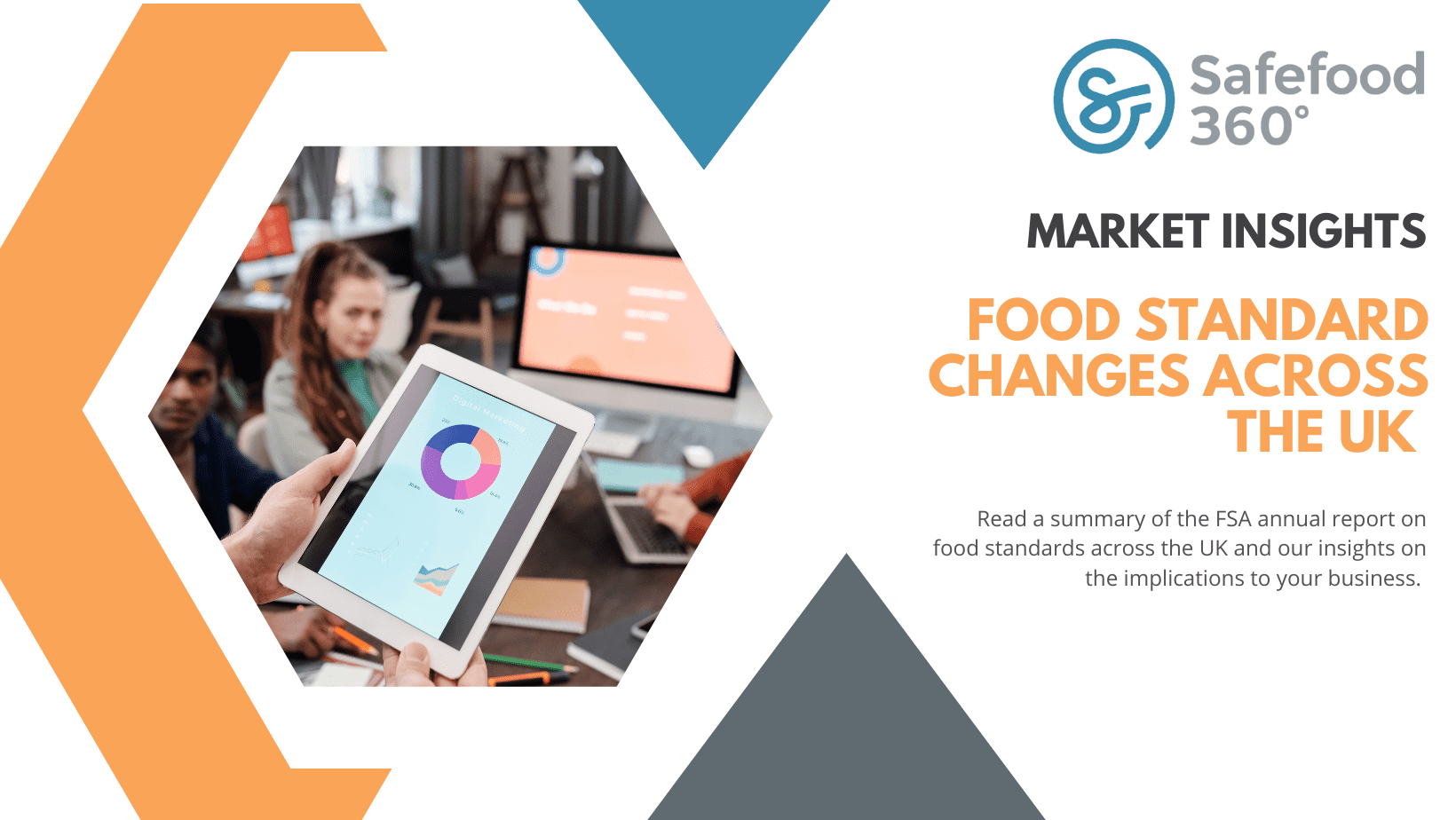
FSA has released their annual food standards report reviewing food industry trends and changes after the pandemic and the Brexit, here are the impacts on your business:
Since the beginning of COVID-19, in conjunction with the departure from the EU, the UK’s food system was greatly affected in many aspects, including food and feed safety, restaurant compliance and imported food monitoring.
Every country possesses it’s own food safety standards, and has potential food dangers when imported or exported. The summary of the Food Standards Agency (FSA) Report 2021 contains:
The Nation’s Plate
Data shows that over the past ten years, the nation’s nutrient intake stayed consistent, but although the sugar intake decreased overall, consumers eat more than the recommended dosage with about 28% of England adults living with obesity as of 2019. The average weight of adult-age Brits increased with the lack of physical activity and the change in the way adults ate throughout the pandemic – showing an overindulgence in sugar-filled and fatty foods and not enough portions of fibers, fruits, vegetables and fish. But who is responsible for this?
Average consumption of free sugars as a proportion of daily total energy (2020)
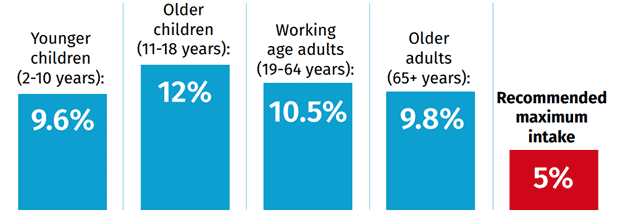
Source: Public Health England NDNS: Diet and physical activity – a follow-up study during COVID-19
Average daily saturated fat consumption as a proportion of daily total energy (2020)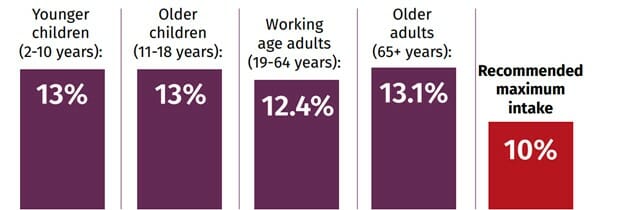
Source: Public Health England NDNS: Diet and physical activity – a follow-up study during COVID-19
According to research from the FSA and FSS’s (The UK Public’s Interests, Needs and Concerns Around Food research), 22% of people in the UK order from takeout and 23% order delivery services at least once a week – mostly coming from young adults or those from higher income households.
The factors found to influence our food choices in recent years according to this data include:
- The price of food: Healthy foods are “priced out” for most people and difficult to keep both wallet and body healthy
- Health concerns: After education over the years, 49% of people interviewed alerted to avoid food with trans fats, palm oil, preservatives, or E numbers
- Eating trends: More people are turning to a “flexitarian” diet to reduce their meat intake
- Ethical concerns: the treatment of animals in the food chain would be a factor of not eating meats; the plastic waste would be another key factor in environmental concern
Impacts from the pandemic on food consumption choices:
- Having healthy eating is tougher to the consumers due to their financial situations
- The pandemic allows more people to cook at home and have healthier options
- Consumers tended to eat more snacks during the lockdown
- More online grocery shopping
Public priorities for the future (research from The FSA and FSS’s The UK Public’s Interests, Needs and Concerns Around Food research) include:
Priority 1: Ensure equitable access to healthy, safe, and affordable foods
- More people intend to purchase healthier foods with an affordable price
Priority 2: Maintain & strengthen food safety and hygiene standards:
- 43% of consumers enforce clearer labelling of food ingredients and allergens is the key priority
Priority 3: Act on additives and processed foods
- People are aware that unhealthy foods contain trans fats, palm oil, preservatives, or E numbers
(Download the full report from the FSA for more priorities, or request demo here for enhancing your business)
Going global:
% of total UK imports sourced from the EU and from other regions, 2017-21
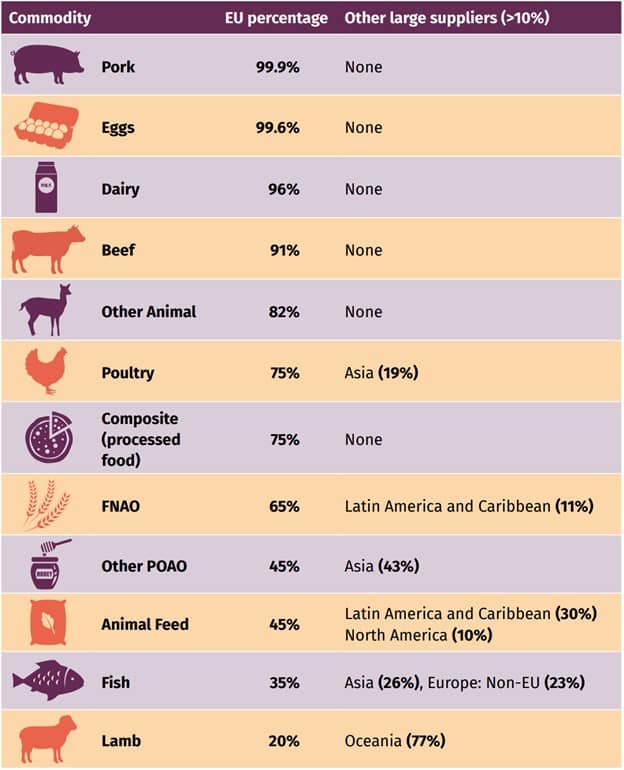
- Around 40 million tons of food are imported from abroad every year; the EU remains by far the biggest supplier, accounting for over 90% of all beef, dairy, eggs, and pork products imported into the UK and nearly two-thirds (65%) of all food and feed not of animal origin
- Despite recent volatility in import patterns, there are no signs of any immediate or wholesale shift in trading flows following the UK’s departure from the EU, though EU imports of fish, lamb and mutton, and pork have all fallen between 2019 and 2021.
- Although there is no evidence that the standards of EU imports have fallen, the FSA and FSS believe the current situation does reduce our ability to prevent foods that do not meet the UK’s high standards from being placed on our market. The lack of import controls means we are not receiving official assurance from the exporting country that imports meet the UK’s high food and feed safety standards; the absence of border checks could also affect how we identify and respond to safety risks in future, with additional resource required by the UK to maintain levels of food safety assurance for these imports
The impact of EU departure on import controls:
- The protocols on Ireland/Northern Ireland took effect on 1 January 2021 and requires Northern Ireland to apply EU import requirements on any products entering the EU regulatory zone from outside the EU
- Not receiving official assurance from the exporting countries that those imports meet the UK’s high food and feed safety standards
To keep rapid alerts available from the latest news from the world, Safefood 360° RISK provides alert system to monitor. Safefood 360° RISK combines both RASFF and World Bank data for the most up to date news and risk alerts and monitor safety alerts worldwide.
Safe and Sound:
- There are 2,363 reported food incidents in the UK in 2021, down from 2019 (2,598) but remains similar number to 2020 (2,261).
- Contamination by harmful micro-organisms was the most frequently reported hazard: 584 cases (browse our technical datasheet to understand how to prevent the harm from the hazards)
- There have been increasing numbers in incidents involving poultry meat in the UK from 2019 – 2021 (83 to 238 cases); especially seen in Salmonella in breaded chicken (download our datasheet about the Salmonella to know the prevention of it)
- Dietetic food incidents have nearly doubled since the previous year (128 cases to 207)
Total number of product recall information notices issued in the UK
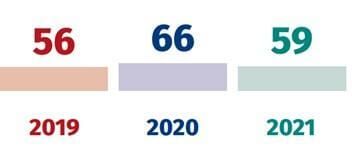
Source: FSA/FSS Incident Management Systems
There are 59 cases of recall in the UK in 2021.
Once the food incident has been identified, the food product may have to be withdrawn or recalled, not only costing food businesses money and reputation, but also directly affects the public’s health.
Most of the incidents can be avoided by the good management procedure (HACCP) and by managing the food process with Safety plan management solution. Request a demo to learn more about how Safefood 360° helps you to reduce the chances of food related incidents.
Informing Consumers
The UK’s departure from the EU prompted a series of actions designed to minimise disruption, including new legislation, changes to compositional standards and origin labelling. A new UK Nutrition and Health Claims Committee (UKNHCC) has also been established to provide expert advice and scrutiny on food marketing claims. Existing arrangements remain in Northern Ireland under the terms of the Protocol on Ireland/Northern Ireland.
The food labelling must contain the information below:
- Name and description
- Ingredients list
- Nutritional information
- Best before or use by date
- Warnings if the food contains additives such as caffeine
- Places of Origin
Food Labels
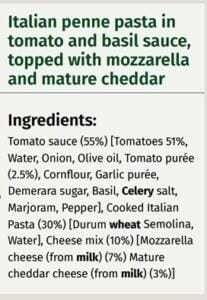

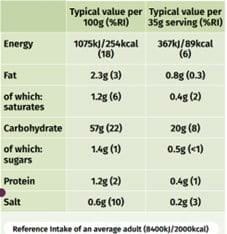
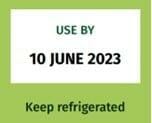

Source: Our Food 2021, FSA report
From a consumer’s point of view, this has had very little noticeable impact to date – the immediate focus has been on maintaining continuity with existing EU laws to minimise any disruption to the supply chain. However, for food business owners, some important foundations for a post-EU approach to food information standards have been put in place:
- Food law changes into British law
- Removing mutual recognition of food composition standards from 1 Oct 2022
- Changes to address and country of origin labelling
What if you have over 500 products in your food business? Our Food Safety Management Solution is designed to improve your business processes within the food industry, allowing you to easily pass audits and maintain compliance with GFSI recognised food safety standards. Browse our Food Safety Management Solution to learn how it helps your business and your supplier chain.
If you are ready to learn more now, request a demo with one of our food safety experts.
Keeping It Clean
The current level of legal compliance with hygiene standards across food and feed businesses in the UK:
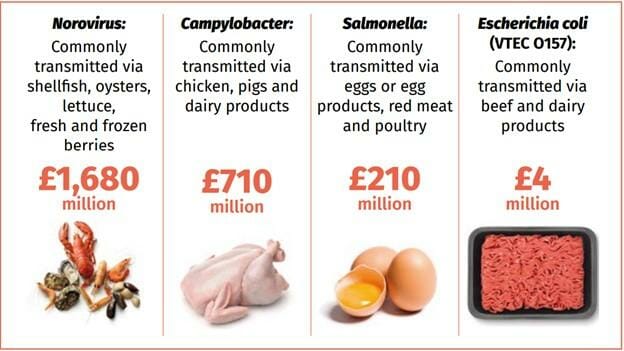
Keeping to monitor the latest legilastion is not easy. Safefood 360° provides an integrated platform for your food safety management and supplier quality management. The software is built by a group of food experts to customise what you really need to secure the assurance and make your aduit become easy. If you have any questions about your current FSMS, SQMS or RISK Assessment systems, submit a demo request for a professional consultation to get your business into next level.
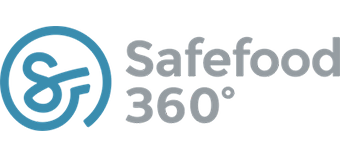


[Watch] The Economic Benefits to Food Manufacturers Implementing Safefood 360°
in blogWe are pleased to announce the first of its kind empirical study which examines the economical benefit of implementing software solutions such as Safefood 360°.
Although the uptake of dedicated software solutions to manage Food Safety and Supplier Quality Management has increased significantly in recent years, the independent study of their benefits has, until now, remained a relatively under explored topic of study.
To address this, we have commissioned an independent report from academic researchers Dr. Ray Lambert and Dr. Marion Frenz, to explore these key benefits of implementing Safefood software and present their results in a transparent way, without fluff or commercial spin.
The report, now available to download here, has been preceded by a launch webinar which is now available to view on-demand:
About the report
The aim of this research is to provide objective analysis of benefits of deploying the Safefood 360° platform directly into a food manufacturing facility, as well as at a wider business group level.
The intention of this report is to determine through quantitative and qualitative means the perceived economic value Safefood 360° solutions bring to the business across time, cost, and efficiency savings.
All key stakeholders and users from Safefood sites were invited to take part in the survey with approximately 25% participating.
Their involvement was anonymous, and no identifiers were used.
The only discerning questions asked where to separate novice uses from experienced (length of time their organisation had Safefood), and to allow analysis between single site and multi-site implementations.
Responses were solicited directly within the Safefood application for a period of 8 weeks.
All responses were collected between October – December, 2024.
Existing Research
While previous research extensively discusses conceptual models of FSM and SQM, and the potential for specialised software, there is a notable lack of empirical studies.
The most relevant body of research highlights the commercial benefits and resource costs of adopting food safety standards like BRCGS, IFS, and ISO 22000.
However, while compliance with standards does offer commercial benefits, implementation costs and the time spent by staff in executing and subsequently reporting on tasks are concerns for some businesses.
Software solutions, such as the one assessed in this study offered by Safefood 360°, can mitigate these costs, enhancing the value of these standards and ongoing compliance of food manufacturers.
Research Findings
The report has found strong evidence that using Safefood 360° software can reduce costs and resources required to maintain food safety and supplier quality compliance.
These benefits are across a range of business functions, including business efficiency, internal audits, supplier audits, information and document management, and dissemination of information for monitoring management actions among the leading areas.
Impacts on the storage, retrieval, and use of essential documents were most commonly reported.
A significant share of businesses also stated that the software provided effective support for audit functions:
For monitoring records, management actions conducted in the software saw that:
On the scale of impacts:
More than 10% in time savings were generated in the following areas:
The effects of accessing and sharing data across the business saw that:
Supplier Quality Management Results
Lastly, the benefits of Supplier Quality Management was assessed concurrently and produced notable results:
What these results mean
Overall, the survey results confirm and build upon the insights from previous research that implementing compliance standards also provides efficiency gains to food manufacturers.
Further, these efficiency gains can be significantly increased through the implementation of dedicated software solutions for compliance management, such as Safefood 360°.
Specifically, the Safefood 360° solution demonstrates significant results in enabling food manufacturers to materially reduce the level of resources they need in maintaining compliance.
By reducing resources needed to maintain GFSI, legal, and retailer technical compliance, this also enables the material increase of commercial meanings, meaning food manufacturers, producers and storers, can enable greater oversight while reducing their bottom line cost basis.
These results are also augmented and supported by operating in compliance with one or more food safety standards.
The exact level of cost savings will be unique to an individual business as it will vary based on what modules and the level to which they are deployed, savings will tend to accumulate across all areas where the software is implemented.
Get help calculating your own cost savings and efficiency gains
Determining what the specific cost savings for your business starts with a no obligation conversation.
Our team will assess your current practices and where you can make these cost savings.
Following this talk, we’ll also arrange a no-pressure demonstration of the platform for you and your colleagues so you can see the system in use.
An Introduction to the basics of Food Irradiation
in blogDid you know one of the more unique ways of preserving and guaranteeing safe quality food is by exposing it to radiation?
This is typically done through either gamma or x-ray’s, and if you were a comic book geek or just a laymen fan of the Avengers, you might immediately think of The Incredible Hulk and have concerns, but fear not dear reader! This is a safe processing method that can guarantee longer shelf life and sustainability for food.
In very simple terms, the treated food of choice is exposed to electron beams or ionized radiation which kill the germs on the food that could cause foodborne illness or poisoning.
This typically occurs once the food has been packed and is the final stage of the production process, occurring at a dedicated facility and before the product ships to the end customer.
Unlike other processes like pasteurization or canning, no heat is used, and as such, it can be considered a “cold” method of preservation.
If you are critically minded, you might be thinking right now, what are the benefits and drawbacks of this?
That’s a fair question, so let’s dive in:
How does food irradiation happen?
First and foremost, it’s important to stress that while food irradiation is safe and has large commercial benefits, it should never be used substitute for other Good Manufacturing Practices.
Irradiation occurs at the end of your practice and should be the final step in ensuring safe quality products – but never as the only means of preservation or food.
This means that the food manufactured has already followed all best practices that align with Codex Alimentarius or the dedicated standard of your choice, whether that be BRCGS, FSSC, Global GAP, SQF or any other GFSI or similar scheme.
Rather than reinvent the wheel, there’s a fantastic guide on the CDC website for this that is very accessible.
Typically packaged food like vegetables, meat, or spices are sent to a dedicated facility and passed through an irradiation chamber which bursts concentrated ionised radiation onto the food to destabilize its hydrogen bonds, which prevents DNA and RNA replication.
The food actually absorbs this radiation but once the treatment concludes, it quickly dissipates and leaves, causing no long term effect.
Once the food has been treated any free radicals that form are extremely reactive and so do not have a lasting presence.
It has no impact on non-living tissue and can also be used to slow down vegetable ripening due to the same factors.
Is it Safe?
Food irradiation is a common enough practice that is carried out in more than 60 countries over more than 500,000 tons of food products each year.
With the correct application, it is a safe practice that can enhance the robustness of a food safety system, but it should never be used to substitute for other Good Manufacturing Practices.
For example, should you spot rot or decay on produce, the item should be discarded.
While applying irradiation to it will prevent further decay, it will not negate the damage that has already been done.
As climate change and global supply chains increase in complexity, its place may become more common as it provides an additional guarantee that invasive insects or harmful species are not being shipped undetected in final products.
Although irradiation is a common practice, its commonality and application does vary from region to region.
In countries that have adopted the Codex Alimentarius in full, such as Pakistan and Brazil, there are no restrictions to its use, but the EU only allows herbs, spices, vegetable seasonings, cereals, raw milk, some bindings and shellfish to be used.
It should be noted, that even though there are restrictions currently, there is disagreement within the EU with some countries wishing to expand it to include the likes of chicken meat, egg whites, frog legs and crustaceans such as shrimp.
In these circumstance, some national agencies allow greater freedom to apply irradiation to food stuffs, but other countries can exercise their right to block their import.
It is important irradiated food is always clearly highlighted so consumers can make an informed opinion.
The Radura symbol
The Radura logo is an internationally recognised symbol that was introduced in the 1960’s that can be placed on all treated food products to show they have been exposed to irradiation.
The word itself is a portmanteau, combining the first half of “radiation” with “durus”, a Latin word meaning ‘hard’ or ‘lasting’.
Although there can be some variance in the logo, the shape and placement, is always the same.
It is a circle, with the top half noted by broken lines symbolising the radiation waves, with another full circle, or dot, in the middle and two leaves below it, symbolizing a plant.
The colour is always a shade of green, but this can vary from region to region, with the FDA version being a darker shade of green in the United States than the more bright, almost radioactive, shade that is used internationally.
Although the symbol is designed for international use and to be immediately recognised, it is not a mandatory symbol in many places and its usage depends not just on the regulation of the specific country or region, but can also be omitted due to public perception of what irradiation means.
What else can you do to make food safer?
As already stated, irradiation should only ever be applied following other GMP’s being conducted thoroughly.
It is one of many tools in the arsenal of a food safety practitioner that can be applied should they have the resources and inclination to do so.
Should they be constrained in these resources with time sinks or find they need assistance with other areas of their GMP’s, there are solutions that can help.
One of these solutions is ours, Safefood 360, which provides food manufacturers with comprehensives solutions for all things Food Safety and Supplier Quality Management.
With more than 35 modules covering everything from HACCP, Audits and Corrective Actions through to Monitoring production records and Supplier Pre-Assessments and yearly appraisals, we have everything you need to allow your team’s to focus on more value added activity.
Should you be interested in seeing how we can help your business, please click the button below and one of our team member’s will schedule a no obligation look at the system for you at a time of your convenience.
Protecting Our Food: Effectively Tackling Food Fraud
in blogGeo-political and “black swan” events in the last couple of years have re-emphasised how crucial it is for the global food supply chain to be strengthened.
With the curtain now falling on a year of global elections, it remains to be seen how trade and policy will affect what and how we eat.
The massive uptick of Artificial Intelligence solutions has created a deluge of information overload to the point that roughly only about 30% of data in Enterprises is actually used.
Finally, and unfortunately, rising costs across manufacturing and delivery also mean we need to be more vigilant than ever against bad actors in the supply chain who are motivated by economic gain rather than moral concern to the end customer that what they produce is safe.
Where food fraud does occur, it can quickly undo a significant amount of good will for all good faith actors otherwise.
With fraudulent activities ranging from the misrepresentation of a product’s origin to the blatant substitution or imitation of the product itself, the impact is widespread, affecting everything from economic stability to wider public safety.
Addressing this issue requires a multi-faceted approach involving stringent regulations, advanced technologies, and collaborative efforts across the entire supply chain.
In this blog, we’ll explore the key challenges posed by food fraud, examine most common high-risk products, and highlight effective strategies to strengthen food supply integrity and restore consumer confidence in the products they purchase.
Understanding the Threat of Food Fraud
Food fraud, as defined by the UK Food Standards Agency, involves “deliberately placing food on the market, for financial gain, with the intention of deceiving the consumer.”
Such practices can be harmful to consumers, who may be misled about the authenticity of food or animal feed, often at the risk of their health.
Factors such as intense and increasing cost-cutting pressures on suppliers and the potential for substantial profits have unfortunately resulted in food fraud becoming a more common practice.
Sometimes it can be as ‘innocuous’ as an ingredient being called something it’s not, such as “Manuka honey” from a different region or plant to where it is native, or outright replacement of ingredients such as saffron being substituted for turmeric or safflower.
In more severe cases, its practice can result in tragic outcomes.
Events such as the Melamine scandal or Horsegate highlight the need for rigorous monitoring and enforcement.
Food fraud typically occurs under the following scenarios:
Certain products are subject to a higher risk of food fraud due to their economic value, production complexity, or susceptibility to adulteration.
Items like olive oil, fish, organic products, dairy, grains, honey, maple syrup, coffee, tea, spices, wine, and fruit juices are common targets.
Olive oil, for instance, often faces adulteration with cheaper oils due to its high market value, while the diversity of wine varieties makes it an easy target for dilution or counterfeiting.
As global food markets grow, ensuring the integrity of food products becomes increasingly vital, with consumer trust and health at stake.
Proactively Addressing Fraud
There are two keys things to consider for beginning to tackle fraud; these are 1) what can be done on a micro level (i.e., within your own supply chain), and 2) what can be done on a macro level (i.e., globally).
At a local site level, it is paramount to remember that for fraud detection and horizon scanning to be effective, it cannot be something static.
The dangers and threats in this area is constantly evolving and so a proactive approach that reflects reality and acceptance of this should be the norm.
In the same way that a HACCP or Food Defense plan would be updated following a process change, so should your TACCP and VACCP whenever there is a supplier or product change.
Active monitoring and threat detection from reputable sources such as EFSA or tools like Fera’s Horizon Scan should be considered.
The good news is that there are many active agencies and departments tackling this issue at regional levels which can support you while also cumulatively constituting a robust global framework, albeit one with some vulnerabilities.
In the United Kingdom, the National Food Crime Unit is a part of the Food Standards Agency which covers incidents within England, Wales and Northern Ireland, while working closely with the Scottish Food Crime and Incidents Unit.
With a mandate to address Food Crime, it specifically focuses on:
While the FSA’s core responsibility is to safeguard public health in its area of remit, it does have handy tools and practices that can be applied no matter where you are based.
Speaking earlier this year at the BRCGS conference in London, one of the tools it advocates for detecting fraud is a handy mnemonic for categorising threats: F-O-O-D C-R-I-M-E-S.
These are areas where threats can occur and where we must be vigilant, and include:
Considering the above will allow any business to gather and structure their intelligence, conduct thorough investigations, engage with their stakeholders to shore up weaknesses, implement more robust checks and processes, and internalise a more cohesive culture in their organisation that fosters continuous improvement.
What other proactive steps can you take to mitigate fraud?
Efforts from organisations like the NFCU play a crucial role in safeguarding the integrity of the food supply chain and protecting public health and consumer interests.
However, we cannot rely on these as a sole measure.
A guiding principle for everyone should be the WHO’s mantra of 2019 that “food safety is everyone’s business”.
If you are an actor or an agent involved in the creation, supply, manufacturing, distribution or service of food, you are responsible for its authenticity just as much as its safety.
In an age of big data and over whelming news cycles, it can be difficult knowing where to get started.
Depending on what part of the supply chain you are involved in, there are multiple options you can consider.
Applications such as Horizon Scanning, Process Analytical Software that uses Spectrometers or Chromatography, Genomics or DNA testing, or comprehensive Quality Management systems that combine Supplier Quality Management with features such as Statistical Analysis tools that can detect anomalies or link directly into Environmental instruments for real time monitoring and providence of data lineage.
We are proud that we offer a tool that helps address the last part of this picture.
Our robust solutions for Food Safety and Supplier Quality Management can assist you in building and instituting a culture of resilience and adaptability against food fraud and crime.
This means you can have peace of mind and ensure trust and confidence both internally with your staff and externally with your consumers, customers and stakeholders.
Preventing potential risks and identifying market vulnerabilities is crucial for businesses to avoid adverse scenarios that can impact brand image, deteriorate customers trust, and ultimately affect the overall company profitability.
Granular levels of control for risk and vulnerabilities assessments can enable a more effective strategy which entails cross-checking supplier risks and vulnerabilities with your own internal processes.
Regular score-carding and reviews of suppliers can help you proactively prepare contingency plans and maintain high standards for proactive future responses when black swan events occur.
If searching for a new vendor, having workflows that streamline pre-assessments can enable faster sourcing when a tried and trusted vendor is not able to deliver.
Obviously, and almost most importantly, this goes without saying, but all of the technologies, frameworks and processes in the world can amount to nought and not substitute for a poor culture.
Equipping your employees with knowledge about the various types of food fraud and how to recognise potential risks in their operations is paramount.
Initiatives like BRCGS’ Food Safety Culture Excellence train and engage, your customers and the results speak for themselves when staff are empowered to identify and report concerns proactively, preventing minor issues from escalating into significant problems.
Tackling fraud is not a simple issue nor is it one that we can rest on our laurels with.
To comprehensively address these risks we must be active, vigilant and continuous in our monitoring to ensure that production is safe for all.
It is abundantly clear that in order to do this while juggling the demands of modern life, technological solutions need to be implemented and can help mitigate some of this burden.
In at least the areas of Food Safety and Supplier Quality Management, we can play a small part in helping your business protect your operations and safeguard your brand equity and customer health.
To see how we can help you foster a continuous culture of resilience and create a more trustworthy food industry for everyone, please request a demonstration or click the button below for more information.